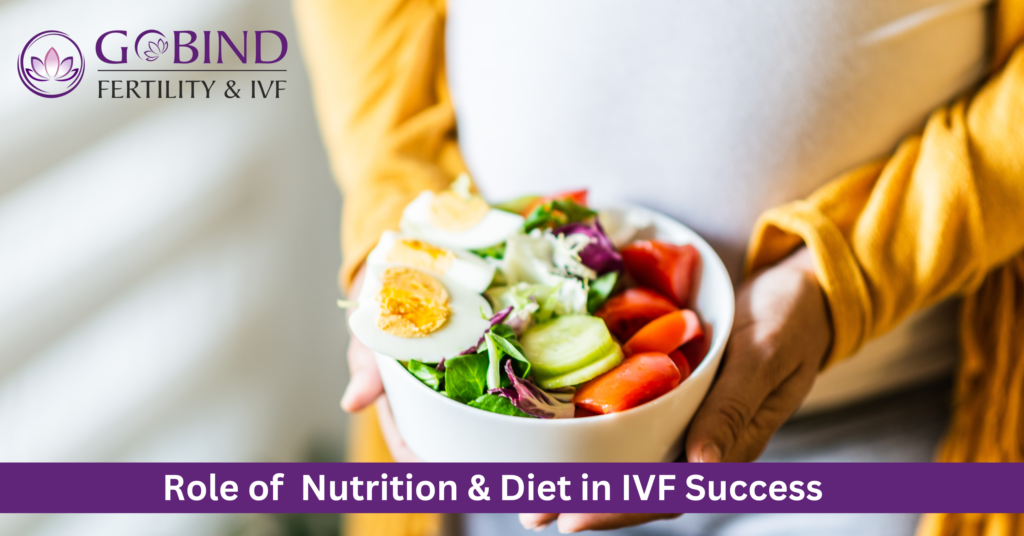Role of Nutrition and Diet in IVF Success

For IVF success, the importance of nutrition and food should not be disregarded. According to research, eating habits can have a significant impact on fertility outcomes, thus people undergoing IVF should pay special attention to their nutritional intake. This article highlights the connection between nutrition, diet, and IVF success and some dietary recommendations which can boost fertility and increase the likelihood of a successful IVF outcome.
Nutrition and IVF Success Connection
Nutrition plays a major role in reproductive health, which includes various factors such as egg quality, sperm health, hormone balance, and overall reproductive function. Individuals undergoing IVF process should improve their dietary health before and during treatment to increase their chances of success.
Well, there are a plethora of important nutrients that have been identified as particularly important in promoting fertility and boosting IVF results.
- Folate and Folic Acid: Folate- is found in leafy greens, citrus fruits, and legumes, which helps in DNA synthesis and cell division. To avoid neural tube abnormalities in the growing baby, sufficient folate should be consumed. For women experiencing IVF process, folic acid, a synthetic version of folate, is frequently prescribed to support early embryo development and lower the chance of birth abnormalities.
- Omega-3 Fatty Acids: – The food items such as Fatty fish, flaxseed, and walnuts which have anti-inflammatory qualities and improves reproductive health. These important fats help in hormone production, control menstrual cycles, and promote normal ovarian function. Including these foods in your diet or taking supplements may help improve egg quality and boost the likelihood of successful embryo implantation during IVF.
- Antioxidants: – Another important nutrient is antioxidants such as vitamins C and E, selenium, and zinc which protect reproductive cells from free radical damage. In the context of IVF, antioxidants protect eggs and sperm from oxidative damage, increasing their viability and fertility potential. Consuming antioxidant-rich foods such as berries, nuts, seeds, and coloured fruits and vegetables can improve reproductive health and aid in IVF success.
- Protein: – It helps to build and repair tissues, including reproductive cells. Well, the women who undergo IVF process should consume the right amount of protein as it helps in follicle development, egg maturation, and embryo implantation. Moreover, lean protein sources, such as poultry, fish, eggs, tofu, and lentils, can supply the amino acids required for optimal reproductive function.
- Iron and Vitamin D:– Insufficient iron and vitamin D levels can lead to poor fertility and pregnancy outcomes. The person who is taking the treatment of IVF should consume an adequate amount of it. Furthermore, to avoid anaemia and improve reproductive health they should eat iron-rich meals such as red meat, chicken, lentils, fortified cereals etc. Besides to increase vitamin D level, they should consume fatty fish, eggs, and fortified dairy products etc.
Dietary Strategies to Optimize IVF Success
In addition to focusing on specific nutrients, various dietary habits can help increase the chances of IVF success. Here is some practical advice for people undergoing fertility treatments. To know more in detail, consult Gobind Fertility and IVF Centre in Hisar :
- Maintain a Balance Ration: A well-rounded diet that includes a variety of nutrients is crucial for supporting overall health and fertility. Emphasize whole grains, fruits, vegetables, lean proteins, and healthy fats in meals to ensure you’re getting a broad spectrum of essential nutrients.
- Limit Processed Foods and Added Sugars: The consumption of excessive sugar leads to infertility, as it increases insulin resistance and creates hormonal abnormalities. Hence, it is recommended that if you want to stay fertile then you should avoid the excessive consumption of sugar snacks, refined grains and processed foods.
- Stay Hydrated: It is important to stay hydrated for a healthy reproductive life. To stay hydrated, you should consume a lot of water. However, you must restrict your caffeine and alcohol consumption to avoid hormonal balance and dehydration.
- Maintain a Healthy Body Weight: – In the modern era, it is quite common, for everyone to have a hectic schedule due to which they do not pay attention to their diet. This results in overweight or underweight. So, this also becomes the reason for infertility and failure of IVF success rate. To avoid it, a proper lifestyle should be maintained which includes exercising regularly, a balanced diet etc.
- Seek Professional Guidance:– For a high success rate of IVF, it is necessary to consult the best fertility specialist or a qualified dietitian. They can guide the patient on the best nutritional diet, supplements and dietary interventions etc. Moreover, if you are looking for the best fertility specialist in Hisar or a nearby area, then consult Gobind Fertility & IVF Centre.
Conclusion
Well, it can be said that above mention points can help you to increase the success rate of IVF. But consultation with the Fertility Expert is a must.

